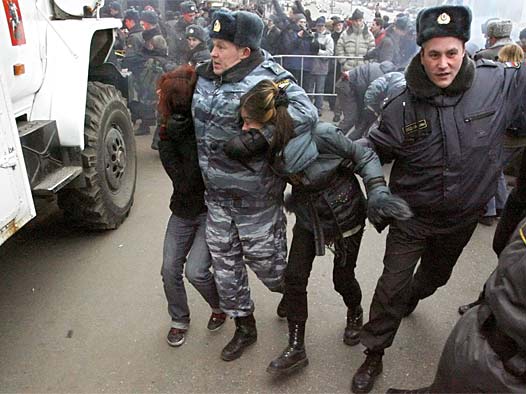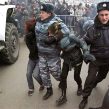
Russian Economy Slows Down, but Protest Activity Remains Feeble
Publication: Eurasia Daily Monitor Volume: 6 Issue: 35
By:

The new economic data released by the Russian Federal Service of State Statistics (Rosstat) last week surprised even the doomsayer-economists, who have become the mainstream in this discredited profession. The key statistic was the drop in industrial output in January by 16 percent compared with January 2008, while the average estimate by experts had been around 12 percent (Kommersant, Vedomosti, February 17). The worst affected area was the manufacturing sector with a 24 percent decline and few signs of revival driven by import substitution that should have been stimulated by the 50 percent devaluation of the ruble against the dollar. The volume of currency speculations noticeably declined in February, so the total reserves have stabilized at about $385 billion (down from $600 billion last August), but it is hard to see this pause as a solid plateau; and it appears probable that the ruble will slip further, perhaps to the psychologically important mark of 50 per dollar (www.lenta.ru, February 19).
The accumulation of unfavorable statistics forced the Ministry for Economic Development to revise its forecast for 2009, so the GDP is now expected to shrink by a full 2 percent (the previous figure was 0.2 percent), and industrial production is expected to fall by 7.4 percent, while the volume of investments will decline by no less than 14 percent (RBC-Daily, Kommersant, February 18). For salaried Russians, these macroeconomic figures translate into two problems: unemployment and falling income. The number of officially registered jobless people reached 1.8 million in February (up from 1.2 million last October), but the real number of unemployed is estimated at 6.1 million (a 23 percent increase from January 2008) or about 8 percent of the economically active population (RIA-Novosti, February 19; Kommersant, February 20). Even that figure does not reveal the full extent of the situation, as many enterprises prefer to shift to part-time work or grant long unpaid leaves, which according to Yevgeni Yasin, the doyen of Russian economists, is only prolonging the crisis (Echo Moscow, February 20).
Statistics on real income in January 2009 show a drop of 6.7 percent compared with January 2008, primarily caused by salary cuts of an astounding 26.7 percent from December to January (Nezavisimaya gazeta, Vedomosti, February 20). The government has pledged to continue implementing its plan for raising pensions and salaries in the state sector, but it nevertheless expects a contraction of real income by 8.3 percent for the year 2009. A key factor behind this vanishing prosperity, which determines the weakening of domestic demand for consumer goods, is inflation, which is expected to stay at 13 to 14 percent for all of 2009 but has already reached 3.2 percent in mid-February (www.lenta.ru, February 18). As the government is forced to correct its key estimates downward nearly every week, it is becoming increasingly apparent that the Russian economy cannot function normally so long as oil prices stay as low as $45 per barrel.
What is rather surprising in this situation of progressive economic dislocation is that protest activity remains low and does not show any pronounced tendency toward radicalization. It is obvious that strikes in the depressed industries make little sense, but street rallies tend to attract the nervous attention of the authorities as shown by the deployment of special police forces from the Moscow region in December to disperse a demonstration in Vladivostok. Since then, however, several similar protests there have been allowed to proceed peacefully, despite the slogan "Putler kaput!" (Putler is a fusion of Adolf Hitler and Vladimir Putin), and last Saturday the newly-formed Solidarnost movement held a street rally in downtown Moscow attended by some 600 unmolested "radicals," who cheered the speeches of Garry Kasparov and Mikhail Kasyanov (www.grani.ru, February 21).
Even in the so-called "mono-cities" that are largely dependent upon a single huge industrial plant and are therefore the most painfully affected by the recession, protests remain muted. Yevgeni Gontmakher, who startled the political mainstream last November by publishing a possible scenario for an uprising in such an insolvent provincial town, now argues that most people are inclined to grant the authorities a few more months to take emergency measures and put the economy on the track to recovery (Echo Moscow, February 20).
There is certainly nothing automatic in the rise of protests with the deepening of an economic crisis, and democratic states generally tend to see discontent organized by alert trade unions come to the boil more quickly than authoritarian regimes that excel at suppressing the opposition. Various special forces and police units in Russia have indeed been strengthened in anticipation of possible unrest, but in the meantime Prime Minister Vladimir Putin and his associate President Dmitry Medvedev rely more on running the propaganda machine at full-throttle (RBC Daily, February 20). Whatever spin is put on the anti-crisis policies, however, it is difficult to hide the fact that they are swinging from one direction to another without any consistent plan and that they are producing little if any positive impact. Medvedev has begun replacing the governors, who keep complaining that huge financial disbursements have not trickled down from Moscow to the regions; and he is barely able to hide his irritation about the sabotage of his direct orders by the bureaucratic apparatus: "We are only talking and still talking about it!" (www.gazeta.ru, February 20).
Medvedev’s helplessness is hardly a factor of much importance in Russia’s de facto unipolar political system, but Putin’s progressive inability to execute his authority most certainly is (New Times, February 16). During his long reign, he has organized his court in such a strict order that his aides and advisors tell him only what he wants to hear; and this ritual denies him access to the unpleasant truth, which makes his crisis management work entirely ineffective. Since "manual control" is his preferred style of leadership, nobody in the government dares show any initiative, and the emergency measures are typically not only belated but also distorted by parochial interests of competing Kremlin clans. It is possible to continue the pattern of denial of responsibility for economic blunders and fraud only so long, but the moment of reckoning is looming, and the easiest way out for opportunistic courtiers and desperate oligarchs would be to flock to Medvedev and pin the blame on Putin. That would hardly help much in discharging the growing social discontent, but this "elite" is incapable of either staging an autocratic coup or launching a reform project.




